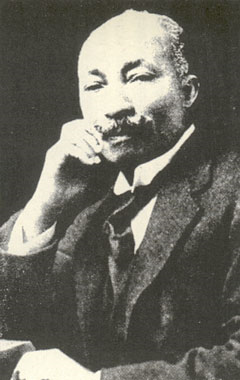Nationalism

As was the case of European countries, or of the United States, African national identity was constructed over the course of time. The goal was to get the members of a larger community to identify with each other, rather than their specific tribe, clan, or family. In Africa this process started during the 20th century, and continues to this day – it is a process fraught with challenges. Failure has sometimes resulted in catastrophe, as it did in Rwanda in 1994. As the case of Rwanda shows, ethnic and tribal differences that colonizers exploited for their own purposes could turn into violent clashes. European colonies were not created with any thought to ethnic, tribal, or religious divisions, with the result that each African country may not flow along any natural cultural boundaries – ethnic groups often found themselves divided by colonial or national borders, creating instability.
The reality of how Europeans drew borders within Africa created a special challenge for African leaders trying to resist European domination. Not only did they have to determine how much to assimilate with the cultures of colonial powers, but how to incorporate that into an African identity that was difficult to define due to ethnic and religious differences. Early efforts to build African nationalism were led by intellectuals educated by European missionaries, who occupied the space between Africans and European powers and often wanted to take over governing themselves rather than devolving it upon the people. Some, however, envisioned a more populist style of nationalism and determined to restore local customs and heritage. That required them to recover their heritage after decades of European efforts to define Africans as “barbarous,” leading to efforts to re-educate their communities.
South Africa’s Bhambatha Rebellion – War of the Heads
Please watch the following video, which outlines a Zulu Nation act of rebellion against their British overlords.
South Africa’s Bhambatha Rebellion: War of the Heads. Films on Demand. 2009. Accessed October 31, 2020. https://ccco.idm.oclc.org/login?url=https://fod.infobase.com/PortalPlaylists.aspx?wID=151823&xtid=51948. 46:58.
South Africa’s Bhambatha Rebellion: War of the Heads [via Films on Demand]
If you get an error saying the video can’t be authenticated, use the link found in the title to view it.
Knowledge Check
Use the following ungraded, self-check questions to confirm your learning for this module.
References
“Nationalism, Africa.” Encyclopedia of Western Colonialism since 1450. Accessed August 10, 2018. https://www.encyclopedia.com/history/encyclopedias-almanacs-transcripts-and-maps/nationalism-africa.
“Nationalism in Africa – Development of African Nationalism.” – Colonial, Africans, Nations, and European. Accessed May 25, 2015. http://science.jrank.org/pages/10396/Nationalism-in-Africa-Development-African-Nationalism.html.
“Nationalism in Africa – Pan-africanism.” Africans, Ethiopia, Movements, and Blacks. Accessed May 25, 2015. http://science.jrank.org/pages/10397/Nationalism-in-Africa-Pan-Africanism.html.
